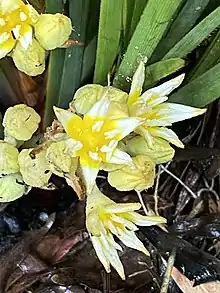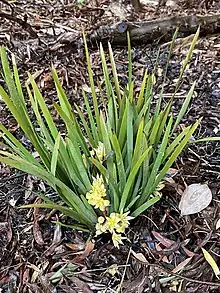| Conostylis serrulata | |
|---|---|
 | |
| Scientific classification | |
| Kingdom: | Plantae |
| Clade: | Tracheophytes |
| Clade: | Angiosperms |
| Clade: | Monocots |
| Clade: | Commelinids |
| Order: | Commelinales |
| Family: | Haemodoraceae |
| Genus: | Conostylis |
| Species: | C. serrulata |
| Binomial name | |
| Conostylis serrulata | |

Conostylis serrulata is a flowering plant in the family Haemodoraceae and is endemic to the south-west of Western Australia. It is a small perennial with yellow cream flowers and flat, green leaves.
Description
Conostylis serrulata is a small, tufted perennial growing from a rhizome and a grass-like habit growing to 0.1–0.4 m (3.9 in – 1 ft 3.7 in) high. It usually has small, stiff, straight branches arising from the base. The leaves are 130–330 mm (5.1–13.0 in) long, and 3.5–6 mm (0.14–0.24 in) wide, hairs on the margins 0.2–0.5 mm (0.0079–0.0197 in) long and a smooth surface. The creamish yellow flowers are 12–15 mm (0.47–0.59 in) long, pedicels 3–10 mm (0.12–0.39 in) long, bracts 5.5–7 mm (0.22–0.28 in) long, and six stamens. Flowering occurs in late winter, September or October.[2]
Taxonomy and naming
Conostylis serrulata was first formally described in 1810 by Robert Brown and the description was published in Prodromus Florae Novae Hollandiae et Insulae Van Diemen.[3][4]The specific epithet (serrulata) is in reference to the "finely serrate" leaves.[5]
Distribution and habitat
This conostylis grows in laterite gravel on the south coast of Western Australia.[2]
References
- ↑ "Conostylis serrulata". Australian Plant Census. Retrieved 10 October 2021.
- 1 2 Hollister, C.; Thiele, K.R. "Conostylis serrulata". Florabase-the Western Australian Flora. Department of Biodiversity, Conservation and Attractions. Retrieved 11 October 2021.
- ↑ "Conostylis serrulata". Australian Plant Name Index. Retrieved 11 October 2021.
- ↑ Brown, Robert (1810). "Conostylis serrulata". Prodromus florae Novae Hollandiae et insulae Van-Diemen, exhibens characteres plantarum quas annis 1802-1805: 300. Retrieved 11 October 2021.
- ↑ Sharr, Francis Aubi; George, Alex (2019). Western Australian Plant Names and Their Meanings (3rd ed.). Kardinya, WA: Four Gables Press. p. 306. ISBN 9780958034180.